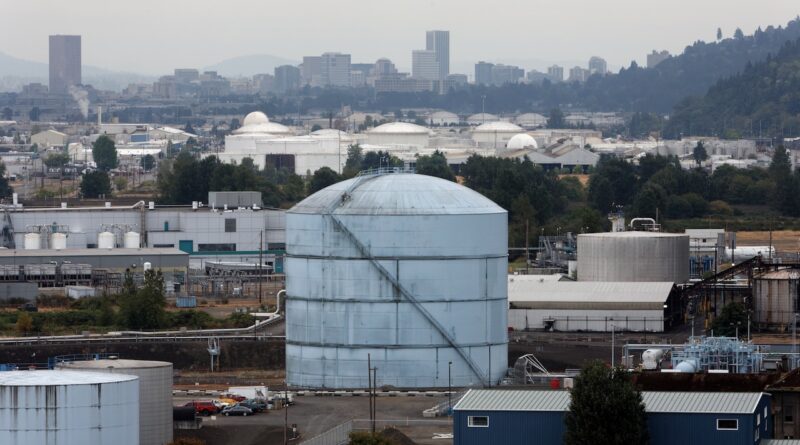Oregon DEQ says NW Natural is misleading the public about the state’s climate program
Oregon environmentalists are concerned that the state’s largest natural gas utility is misinforming consumers about an important climate change policy aimed at reducing greenhouse gases.
NW Natural, which provides natural gas to more than 2 million people in Oregon and southwest Washington, told its customers in a newsletter this month that the state is proposing a carbon offset program that could not lead to a reduction in greenhouse gas emissions.
This is not true, according to the Oregon Department of Environmental Quality.
“The primary purpose of Community Climate Investments is to support projects that reduce greenhouse gas emissions in Oregon,” said Lauren Wirtis, DEQ spokeswoman in an email.
NW Natural did not immediately respond to a request for more information.
Carbon credits, called Community Climate Investments or CCIs, are part of the National Climate Protection Program that was passed for the first time in 2021 but is being renewed this year according to the judicial decision in the case. NW Natural and two other natural gas companies filed a lawsuit to overturn the conservation program, which includes mitigation goals.
Under the climate program, the state would sell carbon credits to Oregon’s fossil fuel companies to help them reduce some of their emissions and meet state targets. The government, through a series of climate laws, is trying to achieve a 50% reduction in greenhouse gas pollution by 2035 and a 90% reduction by 2050 to face the growing threat of climate change. the sky. The Commission on Environmental Quality will decide whether to approve the new Climate Protection Program by the end of the year.
The proceeds from the sale of each carbon credit will be invested in projects that reduce emissions from Oregon. One credit is equivalent to one metric ton of carbon dioxide released into the atmosphere, and companies can buy them for $129 per credit.
But in its newsletter, NW Natural said that was not the case.
“In its carbon report, DEQ will include CCIs as emissions savings even if the project does not reduce emissions,” it reads. The sale of carbon credits, the paper says, “may – but need not – result in future emissions reductions.”
In an email, Wirtis cited three provisions of the Climate Protection plan that indicate that every credit the government sells would have to be equal to a metric ton of carbon dioxide not released into the atmosphere. The $129 price per credit, described in the NW Natural magazine as “the most expensive in North America,” includes a 4.5% fee so that the DEQ can pay for inspections of all projects to ensure that the credit each reduces greenhouse gas emissions. DEQ will report compliance to the Commission on Environmental Quality every two years.
The price per Oregon credit is about six times higher than the average credit rate in the unregulated carbon markets, and about 1.5 times the price of the average credit in the state-run markets in California, Washington and British Columbia. , Canada.
Only projects that reduce emissions, such as building a greenhouse, heat pump or solar power system, or buying electric vehicles or car chargers can earn money from the sale of credits, according to DEQ officials. The borrowers, most of whom are non-profits working on public projects, will be the beneficiaries responsible for carrying out the work.
“DEQ developed this model rather than allowing companies to choose their own projects, to better ensure that the Oregon community will participate in the development of the projects, which will directly benefit from the projects through reduced pollution and that many nations can benefit from investments that support the transition to clean fuels and modern technologies,” said Wirtis.
In its newsletter, NW Natural officials also warned that residential rates could rise as much as 14% in the first year the climate program is implemented if it is passed, and 35% over the next few years. the next ten. A footnote says that the estimate is based on typical consumer usage and typical consumer weather conditions.
Charlotte Shuff, a spokeswoman for the watchdog group Citizens’ Utility Board, says it’s hard to know how accurate that is without analyzing the data the company uses.
“It’s very difficult to say how real the rate impacts NW Natural is talking about,” he said in an email. “We’ve seen NW Natural’s past practice increase the impact of consumer spending. They’ve done it in conversations with consumers. They’ve done it in presentations to lawmakers.”
The guidelines outlined for the federal transfer of the 2021 Climate Protection Program were published in late July by the Oregon Department of Environmental Quality. The agency has given the public until Friday, Aug. 30, to comment on them Here.
Alex Baumhardt, Oregon Capital Chronicle
The Oregon Capital Chroniclefounded in 2021, is a nonprofit news organization focused on Oregon state government, politics and policy.
#Oregon #DEQ #Natural #misleading #public #states #climate #program
